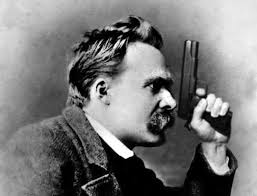
The experience of reading and contemplating Nietzsche is fundamentally different to that of the majority of thinkers. A natural consequence of this is the unprecedented degree to which Nietzsche is misunderstood.
Appreciating Nietzsche isn’t a simple matter of considering a number of competing claims to the truth and deciding if his case is the strongest. He is not such a man that will brook standing in the dock while his ideas are tried by plebs.
Nietzsche is hard for the same reason that integrating a psychedelic trip is hard. This is because to understand him, first you have to concede to his basic contention: that everything you know might be wrong. This makes Nietzsche appear to be a nihilist for anyone who stops reading him at this point, which most people do.
But to appreciate Nietzsche, at least initially, you have to accept that the very way you think may be fundamentally flawed.
His contention is that people have been lied to so often by the church, by the state, by centuries of half-wit philosophers, by power-crazed kings and by the bleating of the herd, that they’re too confused to even begin thinking their way out of it. The way people think is so fundamentally flawed that to make progress the first point of order is to forget all the lies that they currently consider to be true – and there are many.
In fact, you can’t merely forget them – you have to deliberately and purposefully smash them. To get to the truth you have to escape the labyrinth of lies, and so you have to “philosophise with a hammer”.
Understanding the truth of Nietzsche is thus not a pleasant and straightforward experience like sitting in a kindergarten listening to the sweet voice of a kind teacher guiding you gently away from ignorance. It’s more like Hell Week of the Navy Seals, in which a person’s entire personality has to be torn to the ground so that a new, stronger one can be rebuilt in its place.
Regular readers of this column will recognise this phenomenon as the task of the mystic, the shaman or the schizophrenic. Nietzsche himself clearly recognised this when he subtitled Thus Spake Zarathustra as “A Book fof Everyone and No-one.”
This is very evidently not a task for the man of clay; Nietzsche had no intention of founding his own religion for the masses (probably this explains the appeal of Nietzsche among those of the left-hand path).
All of this helps to explain why the name of Nietzsche has been associated with the Nazis.
Any political power who seeks to tear down the established order (which in Hitler’s time was the Anglo-American Empire) and impose their own based on transvaluated values (the Nazi Empire) has one immense – but superficial – connection with Nietzsche’s philosophy in so far that both are revolutionary.
Both seek to tear down old ways that they see as corrupt or decadent. Indeed, crusades against ‘decadent’ art was one of the ways the early Nazis built outrage in their favour, and rhetoric about the corrupting effect of Jews on German society was regular.
Moreover, Nazism was one of the most striking historical examples of a supremacist movement, and supremacists of all stripes find a superficial interest in Nietzsche’s talk of the ‘Superman’.
The great irony here is that Nietzsche would likely have considered the Nazis – like all egoic supremacists – a pack of plebs.
